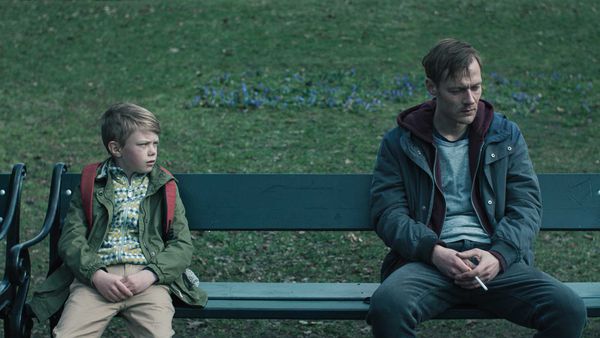 |
| As I Fall Photo: Courtesy of Tallinn Black Nights Film Festival |
"I'm ten years old," says Joachim (Preben Hodneland) at the beginning of Magnus Meyer Arnesen's As I Fall. He patently is not - what we are watching is an adult's account of a dream to the psychotherapist who is seeing him as part of a drugs recovery programme. In his dream - or nightmare, really - Joachim knocks repeatedly at the window outside his home on his own birthday, but his (late) mother, only inches away on the inside, at first does not notice, and when she finally sees him, disappears in apparent disappointment.
Here we see clearly laid out the issues - the sense of failure and abandonment - that have plagued Joachim since childhood, eventually driving him into cycles of addiction. Despite his insistence to counsellors, to his father Sverre (Vidar Sandem) and to his brother Thomas (Morten Svartveit) that he is now clean, Joachim is still using, and caught in a downward spiral of denial, poverty and self-destruction.
If Joachim is still a little boy lost in a man's body, then this most irresponsible of characters suddenly finds himself responsible for an actual eight-year-old boy. For when Joachim's ex-girlfriend Maria (Alexandra Gjerpen) is arrested for possession and faces a lengthy sentence, she calls on Joachim to look after her (and his) son Lukas (Marius Aandal Pedersen), whom Joachim does not at all know. As the film traces the evolving relationship between reluctant father and son, it plays a double game, holding out the twin possibilities that Lukas may save Joachim from himself, or that Lukas, similarly separated from his own mother and feeling unwanted, may just be another damaged Joachim in the making.
This dynamic, and Joachim's seemingly endless drift between remission and relapse, ensure that the film resists easy sentimentalism or wish fulfilment by constantly frustrating the happy ending towards which it fitfully gropes. As the title suggests, we are with Joachim on a journey of decline - with our hero going downhill both metaphorically and, in the end, literally - and while Arnesen lets this drama unfold in a plain, unfussy style, he adopts an economic film grammar to externalise his protagonist's ups and downs, tracking Joachim at a high angle when he is out to score (and to get high), and shooting him at a more conventional ground level when he is on a more even keel. Joachim's life of heroin has been so askew that his television monitor is turned on its side to align with his hours spent lying in a daze on the sofa. When Lukas comes to share his sofa, Joachim returns the TV to its proper position, creating at least a semblance of restored balance - but the future, both for a sensitive young son and for a father arrested in his own childhood trauma, remains to be resolved (or not) somewhere further down the road.
Happiness Is A Warm Gun (Glück ist ein warmes Gewehr)
Founded in 2015, the Swiss "top ten collectiv" specialises in theatre and performance art - and while Happiness Is A Warm Gun is their first feature film, its limited set and finite ensemble of players (Patricija Broni?, Johanna Dähler, Simon Labhart, Max Roenneberg, Julian Anatol Schneider) ensure that it remains a stagey production. Only the long continuous takes, with the camera slowly panning and tilting through a confined bunker-like setting and necessarily keeping whatever or whomever it passes in queasy close-up, give the illusion of cinema to what otherwise feels like an improvised, experimental play.
Our five actors, drifting in and out of shot and sometimes facing and addressing their co-director Mirko Borscht's camera, seem in search not just of an author, but of a scenario and the odd drink, as they swap rôles and genders and stories, while using whatever props (bread, an axe, drinking glasses, mannequins, pig masks, a swing, a doll and a rifle) are to hand. It is a transgressive mess, meandering incoherently from the topics of pig herds, anti-Semitism, letter-writing, workers' revolution, and infanticide, and finishing at a point as seemingly arbitrary as its beginning. The sound design, conjuring a vivid world outside, is superb, but trapped as we are together with these characters in a claustrophobic, cloying space that is falling to ruin before our very eyes to no obvious end, we can either recognise a reflection of our own fragmenting, decadent society in all its pointless absurdity - or we can just wish that we could escape to whatever is beyond those concrete walls, perhaps even to another, altogether more rewarding film than this one.
- Read capsule reviews of Between Covers and Yung
- Read capsule reviews of Lorik, Erased, Deep Rivers and The World Is Yours
- Read capsule reviews of Slam and Potential Victim
- Read capsule reviews of Lonesome Collectors, Cursed Seat, The Pact and The Fall Of The American Empire
- Read further full reviews and features from Tallinnn Black Nights Film Festival here





















